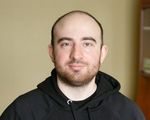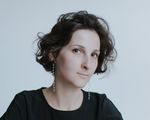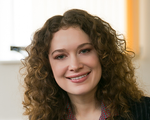About Success Builder
How do you find your place in life? How do you find something to do that both comes naturally to you and makes you happy? The answer is that you have to apply the knowledge you’ve gained from university and from life itself correctly. The Success Builder Project features HSE University graduates who have discovered themselves through an interesting business or an unexpected profession. The protagonists share their experiences and lessons learnt and talk about how they’ve made the most of the opportunities they were given.
It is sometimes necessary to take the less obvious route in order to succeed. HSE alumna Tonia Samsonova, the founder of the media startup The Question claims to have found a way to win over people’s attention. Samsonova tells Success Builder how to turn the practice of meeting people into a business, as well as how to avoid the word ‘advertising’ and how readers can avoid editors.
You have a degree in sociology. How did you end up becoming a journalist – a political journalist at that?
I really don’t know how one develops an interest in politics. I distinctly remember being a monarchist in 2001 and believing that Russia should be ruled by a tsar – Nikita Mikhalkov, of course. This seamed ideal to me.
When I began working at Echo, I didn’t have any political views. No one at HSE taught me that an absolute monarchy is bad and a democracy is good. But talking with people – instructors and students whom I respected – and reading books all made me think more about the things happening all around me.
One problem always exists though. If you want the university to provide people with a quality education, then you have to accept the fact that it will lead to your students learning to think critically and take a critical approach to their surrounding reality. If you don’t want students to think critically, then don’t improve your country’s education system.
It’s not only lectures that give you a university education; communication is really what made a journalist out of me. HSE is an incubator of opportunities for people who know what they want. I always wanted to be a journalist, and HSE simply helped me realise that. HSE has strange and magical ‘motivators.’ You can meet someone in the corridor, for example, and just walk up and say, ‘I wanna do this’ or ‘I wanna do that,’ and this someone will change your life. We had a sociology club called City (Gorod), as well as a student club called I Think (Ya Dumayu). This is where a lot of my journalistic practice comes from, and it’s in these clubs that I met a lot of important people.
Does your educational background in sociology help you at all in your profession?
This is actually where everything started. I met Venediktov [Alexei Venediktov of Echo of Moscow] at a conference being held by the Faculty of Sociology. I went up to him and told him about an idea I had for a sociology programme that was actually more a continuation of my academic endeavours than journalistic ones. This resulted in my hosting the show Crafty Figures on Echo of Moscow for several years. The experts I invited on the show included scholars from HSE, as well as people whom I had met there. As a sociologist, I just liked the idea of turning a public debate into a scientific plane.
It is now more interesting to be a journalist as well as a historian, philanthropist, or celebrity
How do you personally define journalistic success – by popularity, wealth, number of citations?
I have stopped being a journalist in the way I previously understood my work. I think that the mission I was pursuing in the past is not very realistic today.
For me, the profession of a journalist means opening up the problems that exist in the country for public discussion, and through this discussion, increasing competition in politics and boosting government efficiency.
The long-term objective of such work (though this might be subconscious for the journalist) is to find a problem and draw attention to it so that the institutions capable of resolving this problem can do just that. A journalist provides feedback between the task and the politician, and when a task isn’t being solved, the politician is replaced by a more effective one. This is why good, proper journalism is possible in countries with competitive politics.
But it's not true that journalists in Russia have nothing to write about or nothing to do. There wasn't anything to do in 2011, which is when I started working as the politics editor at Slon. This was during Medvedev's presidency; hashtag 'stability,' nothing changed, and everything seemed fine. There was positively nothing to write about. Public discussion were able to take place, which they did, but they avoided the main issue altogether as if no one paid any attention to the elephant in the room.
The problem of there being no substantive public discussion was quickly resolved, and it immediately became clear what the problem was and what we needed to talk about. But the effectiveness of journalism plummeted. As an example, I don’t currently see the need to have pressing interviews with people in power, and I don’t see any point in carrying out anticorruption investigations. This doesn’t affect the chances that an official or politician will keep his or her job. Accordingly, the institution of journalism as a way of providing feedback and as a method for raising the political efficiency of the state isn’t working.
If you want to be popular and famous, then you’ll always have something to write about. But in terms of your use to the government, even the greatest of efforts will prove to be ineffective.
So we can conclude that it's not good to be a journalist with a mission. Maybe it's better to do something else?
The methods I was using – harsh interviews with politicians in order to make his or her ineffectiveness public, thereby providing feedback and boosting government efficiency – don’t work now. But there are other useful models. For example, creating material about someone and helping him personally, writing a report from Ukraine so that our successors are thankful for a truthful narrative, or carrying out an anticorruption investigation today so that it can be used tomorrow. In short, we should work on the future and on creating archives. This will be useful for our successors.
I don't believe or try to claim that I know what you should be reading better than you do. I think readers are smarter than the people writing for them
Journalism has stopped being power, which is why it’s now more interesting to be a journalist as well as a historian, philanthropist, or celebrity. I always understood journalism to be like power, like a function that boosts state efficiency.
What did you replace your profession with?
When I was at the university, I would reread the texts Vadim Radaev gave us over and over. In one of the texts, I encountered the idea that a person has various forms of capital – money, power, and social connections – and they can all be converted from one to the other. As a senior, I wrote a paper using practical examples for this ephemeral theory, and I understood something very important – if you need to build media, you have to convert money and social capital into readers, and vice versa.
After living in London for a year, I decided to create my own project – The Question. It’s similar to what I was taught at HSE and to what Venediktov taught me – thousands of people listen to you and read your work, and among these thousands are people who are much smarter than you. But it’s you who they gave the microphone to, not them. Their ideas might be much deeper and more interesting than yours, but they don’t have a microphone and they don’t have an audience. When I’d prepare interviews, I would call up 10 of my friends from different backgrounds and ask what they would like to know if they had the chance to talk to the person in my place. I would get questions much smarter and much more pointed and interesting than my own. So my role as a journalist can be reduced to a service – ask all the necessary questions about a certain situation.
How exactly did your connections help with The Question?
I tried to turn what I have always done into a type of service, giving people with the most expert opinions the opportunity to ask questions instead of me. And these very experts are who make up my social capital, my personal knowledge, and connections. At The Question, I use questions and answers to introduce people to one another. You, for example, might not know that someone has questions for you, but the service knows and brings people together when they need to exchange information.
It's almost like a social network. Why didn't you open up a news service like Meduza? This seems like the obvious endeavour even for a ‘former’ journalist...
I don't believe or try to claim that I know what you should be reading better than you do. I think readers are smarter than the people writing for them. An editor tries to guess what we should be talking to an aggregated group of readers about today. A great editor might be a good guesser, but he’s trying to guess about everyone. I want to do what you personally find interesting, Sonya.
Our advertising approach is the same approach taken in regards to the flow of information. It has to reach people who are interested
This is the basic inefficiency of media as a product. You have an editor who decides what people are going to be interested in today. This is how all news is built, and any column is just a way for an author to ask himself a question. Technologically speaking, with The Question we are now able to overcome the problem of the editor who has to decide what everyone should read today. When you openly ask a question about what you’re interested in, it’s convenient for me, as a service, to be able to give you a text as an answer. This is how The Question works. It’s a service that allows you not to waste time on things you’re not interested in.
Nowadays, it’s difficult to convince someone to invest in a media project. How did you find an investor?
I was never looking for someone to invest in a media project. We are creating a technology, not a media source.
How is your project unique from a technological perspective?
Any modern advertising technology requires a researcher, investor, copywriter, and media channel in order to disseminate content. Our advertising approach is the same approach taken in regards to the flow of information. It has to reach people who are interested. We know about our readers’ interests based on the questions they formulate, and we tell them only about the things they ask about. The word ‘advertising’ is currently synonymous with the term ‘irrelevant information,’ when people try to grab your attention in unnecessary ways. You’re watching your favourite TV show when it’s suddenly interrupted by a commercial. What can you do other than wait? When all the information that reaches you is actually relevant, the word ‘advertising’ will cease to exist.
If you ask which car to buy for your family so that it’s safe, cheap on gas, and can fit three kids in the back, and someone tells you, ‘buy a Volvo,’ that’s not a ‘commercial break’ for you. It’s information that you were looking for, and it’s an answer to your question.
Equally as valuable might be a chemist who talks about which chemical reaction a pie undergoes in the oven or what to put on your face to protect it from the sun, given recommendations from a representative of a cosmetics company. This is all organic, targeted advertising. You create communication just by sending requests to people who can fulfil them. You see real people and their questions on The Question, and you give them answers – the real information they were asking for, not imposing nonsense.
How do you manage the project, and what is its structure?
We all live in different cities, so we've learned to work remotely. This is my first real managerial project.
The main thing at The Question is site and application development, which is why the project is about technologies and producing texts almost entirely automatically. We have very low transaction costs on producing texts compared to media, and this was incorporated into our business model from the beginning. This is why the main team consists of designers, programmers, and analysts who handle the internal logic of the technology.
We also learned that it’s not enough to simply create a service; you have to guarantee that there are distribution channels. At the beginning, I didn’t quite understand this concept. You walk all around London and see newspaper kiosks with the Guardian or the Economist, while at one time it was the newspaper that paid for the kiosk to be located near the metro.
And how do you get new readers?
People spend 10 hours a day either producing content or consuming it. Attention is what is valued above all else – who’s going to read us, who will see the content we produce, and what content will we see… Plus, you interact with the world in two different ways as concerns information – the first is full of tags and topics that interest you, while the second involves topics for which you create content. Say you’re an investment banker interested in diving who lives in Moscow with your wife and child...You produce certain content: diving photos, professional advice to your friends, Facebook posts about the diapers you bought, etc. And if you’re interested in reading about physics, political news, and Australia, then we should introduce you to a physicist from Australia who can answer your questions and get your advice on how to buy shares. We’ll find you on social media when you have questions, but have no one to ask.
How does the service allow people to communicate?
Communication occurs through the formulation of a question. This isn’t obvious, but when you transform a problem into a question you are able to solve it because you understand what to do. Online communication, which is emotional and aggressive when it takes place in the form of comments, is also connected with the fact that a person is oftentimes not capable of formulating his or her thoughts, which is when the ‘crap’ that is characteristic of online communication begins. But you could have simply asked a question that the author didn’t answer. Communication among strangers becomes effective when they ask each other the right questions and answer them. This lowers the level of aggression and allows for a discussion to ensue.
What are the results of the project's first year?
On June 28, 2014, I decided to pursue this idea. I wanted to make The Question my main endeavour. Afterwards, there were a lot of different versions of the site and a team was selected. As of right now, the project’s main achievement is the fact that the business model works and the audience doubles every month while spending is growing linearly. The goal was this: grow rapidly while maintaining top quality texts. For me, the project’s success lies in the fact that we’ve found a proper and important model.
How would you assess the role HSE played in your incredible background?
When I was a junior in high school, I won a May Olympiad and got into HSE. I came to Myasnitskaya St. to submit my documents and saw a poster there that said, ‘We learn not for our school, but for our lives.’ Google didn’t exist yet. I just wrote this phrase down, and now I understand that HSE educates specialists in a way that allows their knowledge and experiences to translate into real life. On the other hand, HSE’s graduates include managers and other leaders, and it’s easy for anyone who graduates from HSE to build a career. I can say that as an alumna. It’s important for the university’s mission to correlate with its motto. As a large state university, HSE changes along with the country, but the mission stays the same, no matter what changes take place around us.














































































































































